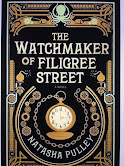Doctor Who: The 60th Anniversary Obsession by Theresa Gauthier
every month. I’ve decided to keep the spotlight moving to my next obsession. (I’ve got one planned for 2024 as well.)
On November 23, 2023, the popular British television show, Doctor Who, turns 60. Through sixty years of adventures—television, radio dramas, audio recordings, books, graphic novels, films—Doctor Who has always found a way into the mainstream, and into the hearts and minds of those of us who love it. In celebration of this milestone year, I’ll be reviewing a Doctor Who book on the first Tuesday of each month through August 2024
I keep selecting obsessions, and in truth, Star Trek, The Beatles, and Doctor Who are three of my major lifetime obsessions. I first found the Doctor in 1978. Flipping through channels, the old-fashioned way—by standing next to the set and turning the knob—I landed on “The Pyramids of Mars” starring Tom Baker and Elisabeth Sladen. I don’t know what made me stop except that Elisabeth Sladen was dressed in a long, white gown, that—in 1978—seemed reminiscent of Carrie Fisher’s Princess Leia costume.
At the time, I knew nothing about the Doctor. I didn’t know about Time Lords, TARDISes, what a Police Box was, or the names of the actors. I also didn’t know that the episode was nearly over when I stopped to watch.
I was mesmerized.
Needless to say, I stuck through it. I figured out what was going on, the rules of regeneration, such as they were, and I soon discovered something else.
The Doctor was smart. That’s what kept me coming back. I’ve always enjoyed clever writing, and this show was written with an eye towards cleverness and wit.
One of the most clever things about the show is the Doctor’s regeneration. This concept kept the show going all these years. It’s actually built into the show’s mythology that the Doctor changes. This concept meant that the entire cast changes periodically—the companions (friends who travel with the Doctor) move on and leave or are left or, in some cases, die. The Doctor changes. His companions move on with their lives. It’s not uncommon for the entire cast to change either in gradual increments or all at once. It’s accepted, expected, and had permitted the show a flexibility that no other show has built into its mythology in quite the same way.
With this simple yet genius concept, we can expect the show to continue for decades more in one form or another.














Comments
Post a Comment